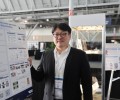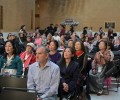| 보스톤코리아 2021-08-23, 22:22:58 |
|
As an undergraduate awarded the Regent’s and Chancellor's Scholarship at the University of California, Berkeley many years ago, I learned quite a bit about systemic racism, oppression, and marginalization. Yet, learning about these concepts on paper would not prepare me in any way to actually experience them in practice within my graduate-level education at Harvard. As a woman who is multi-racial and identifies as Korean-American, I have experienced various forms of discrimination throughout my lifetime, from childhood, through my teenage years, and as an adult. Yet, despite my array of experiences, I have never once encountered the type of structural racism that endures, and is enabled and perpetuated at Harvard, leaving many students alone and fighting for their civil rights alone amidst a sea of frightened students who are far too scared to speak up and lose their position at Harvard. It’s among the most horrific things I have ever come to endure, an ordeal that left me powerless, helpless, and without a voice, yet ended with a vow to devote my life to the causes of social and racial justice. No Grade, No Transcript, No Tuition, and No Recognition for What I had Earned: My story began last semester and despite all that I endured, I have been denied closure to this day. Although I had come to read about two similar situations, I was ignored in every way possible by the University, and it very soon came to appear as if I had paid Harvard for nothing other than to be harassed, bullied, discriminated against, and finally robbed in every academic way possible. By then, I had spent weeks trying to convince Harvard to be reasonable, fair, and transparent, and the only explanation or rationale ever given for what I endured during the semester was “confidential,” and after all those weeks and hundreds of emails, it became abundantly clear that Harvard was intent on doing everything they could to sweep the “matter” under the rug. To this day, I still don’t have a grade for the graduate-level course (Race in a Polarized America) at Harvard where I encountered a racist, retaliatory, and abusive teaching assistant, nor did I have access to my academic transcript, and to top it all off, I was in a state of disbelief that any of this could actually happen within the realm of academia. It was when my stepfather came to have a cancer diagnosis, that I was about ready to throw in the towel altogether. By that time, Harvard had refused to listen to a word of my experience, cared little about the fact that my disability and ethnic heritage were being exploited, and cared even less that the teaching assistant had taken over “instruction” from the Office of Accessibility Services. Even with recorded evidence of an immense level of egregious behavior, saboteur tactics, and mind games I experienced at the hands of their hired teaching assistant, Harvard refused to hold her accountable and refused to listen to a word I had to say. The harassment started on Zoom, during a class discussion early on in the semester. The discussion pertained to the shootings of the Korean women in Atlanta. When she called the women who were murdered in Atlanta prostitutes, I politely stated I was Korean-American, while making myself visible on Zoom for the first time. Up until that point, I did not want to have others see me fumbling about trying to type with my disabled hands (both require surgery) as I struggled to keep up. I then made the polite assertion that Korean news publications referred to the women as mothers, daughters, sisters, and wives, and not as prostitutes like many U.S. news publications have alluded to, due to the stereotypical notions of Asian and Korean women and massage parlors put forth by the media. At that point, it was clear to the entire discussion group that I was Korean-American, and held a view and opinion on Korean women and the ways in which they were labeled. While I was polite in my assertions, it was evident the teaching assistant had become angry that I dared to assert myself in any way. The teaching assistant called me later that night (one of many calls) and snapped “there’s nothing wrong with sex work,” and asked me what I was trying to imply. I was speechless. That phone call lasted for an exceedingly long time, where she lambasted me for using the word “empathy” incorrectly, the word “sorry” irresponsibly, informed me about the mental health issues of the professor for the course, and complained about how hard the professor was coming down on all of the teaching assistants and the stress they felt. She careened back and forth between denigrating me and wanting an at-will confidante of sorts, and I had no idea how to escape her suffocating grip. In time, I would be called raceless, not a real minority, a natural candidate for prostitution, and that Korean comfort women were contracted prostitutes. At that point I was well on my way to becoming an emotional wreck due to her unrelenting anti-me efforts. While I had come to expect the personal insults, I had never before heard such a preposterous notion about the sexualized war-crimes committed against Korean (and many other Asian) women twisted around as “contracted prostitution.” The denialism of Japanese war crimes is well-known but to make the claim that the women they kidnapped and subsequently forced into sexual servitude were actually willing participants out to make a profit was as ludicrous to me then as it is now. It was only later I’d come to find out that the notion of Korean “comfort women” as willing prostitutes was created and perpetuated by a Harvard law professor by the name of J. Mark Ramseyer, whose work I would come to eventually correct, make factually and historically accurate, and send with a miniature Korean flag attached. Through this teaching assistant and throughout the semester, I experienced the exploitation of my disability, further ridicule of my racial background, isolation from my classmates and group partners, and came to realize that she had self-assigned herself the rights to take over and dictate the parameters of my instruction from Accessibility Services, and in the process, make demands that I do significantly more work than any other student in the course. Among the most outrageous of my experiences with her was that I single handedly turned in the first group project I and two other individuals were assigned to. As a group, all of us were supposed to receive the same grade and due to my disability, we were given an extension. This was the most important assignment in the course and would ultimately be used as a reference for its related assignments. As the deadline for the project loomed, I reached out to both of my group members five times each, requesting their insight, contributions, or thoughts of any kind. I received no response from either one and quickly became anxious, as I required surgery on my hands due to severe neurological abnormalities in both, and I could not foresee a way to procure the “A” I desired in the class by myself, without the efforts of my group members. The day before the deadline I made both of them a very basic outline that consisted of one sentence questions such as “which reading or lecture do you feel best pertains to our project?” Still, I received no response, and their contributions were integral to our group submission. As a group, we were supposed to interview public figures and politicians; one of the group members had conducted an interview of her own and I had no information about the interview to write about, while the other member was tasked with compiling statistical data, which I had no access to either. In the end, I ended up making the submission on my own, with my two very disabled hands aching in pain, The next day she met with my two group members privately and subsequently informed me that for “confidential” reasons I would have to do an entirely new group project entirely on my own, along with its related major assignments in the course. Additionally, she informed me that I would no longer be able to contact either of my group members, which was utterly perplexing to me, as one of them had commented on how grateful they were for our budding friendship. I consider her demands an act that I can't describe as anything less than sadistic and amongst the most egregious of all the things I was made to endure, as she was well aware of the pain in my disabled hands, in addition to the other disability I suffer from. I was never given an explanation for why the demands were made of me to begin with, and further, I was never given instruction or direction whatsoever on how to do all the extra work. While stunned, I set about finishing the extra work that was demanded of me; twice the work of other students in that course, as well as work meant for a three-person group. I proceeded determined to not just finish the work but to create the best project in the course; in the process,, secured interviews with a prominent politician who has been an integral part of many of our nation's federal agencies, including the Central Intelligence Agency, a well-known Asian-American politician and attorney in New England, and a 15 year member of the House of Representatives. On a side note: The professor and a dean declined my invitation to attend the interview I was holding with the aforementioned man who has garnered immense respect for his work in the federal government. In any event, the interview lasted for 25 minutes and 15 seconds and I regard it as the greatest honor of my lifetime. Shortly thereafter, the teaching assistant was suddenly started emailing me and asking me if I was “professor,” as well as calling me and telling me a litany of things that I had no interest in hearing about her life, the mental health of the Professor of our course, the stress she and the other teaching assistants felt from the Professor, Harvard’s practice of grade-inflation and ultimately making me feel like the course was akin to attending Russian Roulette. Near the end of the semester, in an expertly timed, purely black-belt level saboteur fashion, the teaching assistant disappeared into thin air, after asking the Professor to tell me not to contact her. Upon being informed of this, I was absolutely stunned. I had never called the teaching assistant, rather she had called me and harassed me countless times. I recalled how she had shown moments of inexplicable “kindness” to me that was clearly disingenuous yet impossible to comprehend, such as the assurances that all the extra work was an opportunity to let my academic prowess be “my time to shine,” and that “I would be just fine” because “all you have to do at Harvard to get a B is to show up” and as long as I followed her instruction and listened to her, I would receive an A. She then disappeared into thin air. Harvard did nothing about it and the dismissive silence was deafening. I have not received closure, nor justice, nor an explanation or apology of any kind. Postscript: Racism, be it through the efforts of an individual or a group, is allowed to continue in our society as a destructive and divisive force because of silence, apathy, and most critically, enablism. Essentially on the same level as perpetuation, enablism is more or less the same concept in different clothing. Harvard’s enablism of the situation both exemplifies and perpetuates the systemic racism that has existed at the University since its inception. Further it is emblematic of the ongoing discrimination that Asian-American women experience everyday in all facets of our society, and proves that we, as Asian-Americans aren’t really welcome to the party at Harvard, regardless of what the latest iteration of diversity and inclusion programs tells us. It’s critically important to note that this is not just about Harvard. Harvard is but a mere reflection of the word we live in today. As of now, the U.S. is experiencing an unprecedented amount of discrimination and violence, particularly against the elderly. 9,000 anti-Asian hate crimes have been reported since the COVID outbreak, politicians, the police, and the overall populace are doing little to nothing about it, and we and our families live in a state of fear because there are far too many are living in fear that James Baldwin was right when he said that “the white man’s sun has set.” Yet, why must there be fear when we can, if we choose, work to build a society where the sun rises for all. Kim Hyun was a former Harvard student who left in protest of racism and oppression and for Ahn Jung Geun, a Korean-American Regents' and Chancellor's Scholar from the University of California, Berkeley, and is currently a teacher and advocate. ⓒ 보스톤코리아(http://www.bostonkorea.com), 무단전재 및 재배포 금지 |
 |
 의견목록 [의견수 : 0]
의견목록 [의견수 : 0]
|
 |
| 등록된 의견이 없습니다. | |
|
|
 프리미엄 광고
프리미엄 광고

161 Harvard Avenue, Suite 4D, Allston, MA 02134
Tel. 617-254-4654 | Fax. 617-254-4210 | Email. [email protected]
Copyright(C) 2006-2018 by BostonKorea.com All Rights Reserved.
Designed and Managed by Loopivot.com

























